The Internal Revenue Service began laying off thousands of employees this week, just as tax season reaches its peak, marking one of the largest personnel cuts at the agency in recent years. The move, which affects roughly 7,000 probationary workers, comes as part of the Trump administration's broader effort to restructure the federal government and reduce spending.
The layoffs primarily impact employees in compliance divisions responsible for enforcing tax laws, collecting delinquent debts, and processing returns. The cuts come at a critical moment, just weeks before the April 15 tax filing deadline, raising concerns about the IRS's ability to provide customer service and ensure timely refunds.
Doreen Greenwald, president of the National Treasury Employees Union, criticized the move, calling it a "recipe for economic disaster." She added, "In the middle of a tax filing season, when taxpayers expect prompt customer service and smooth processing of their tax returns, the administration has chosen to decimate the whole operation by sending dedicated civil servants to the unemployment lines."
The layoffs are the latest in a wave of federal workforce reductions spearheaded by the newly established Department of Government Efficiency (DOGE), led by Tesla CEO Elon Musk. The department has been tasked with identifying inefficiencies and cutting costs across federal agencies, with the IRS among its primary targets.
Kevin Hassett, director of the White House Council of Economic Advisers, suggested the cuts could continue, particularly as the IRS implements new technology. "There are many, many, more than 100,000 people working to collect taxes, and not all of them are fully occupied," Hassett told reporters, adding that additional layoffs "probably can get bigger, especially as we improve the IT at the IRS."
IRS employees in Denver were among the first to receive termination notices on Thursday. Patricia Allen, president of National Treasury Employees Union Chapter 32, said that between 120 and 150 workers in the area were let go, with most receiving an email instructing them to vacate their offices within 30 minutes. "I've been with the IRS for 20 years, and I've never seen this kind of layoff. Never," Allen said.
The cuts also put at risk a series of IRS enforcement initiatives aimed at cracking down on wealthy tax evaders. Under the Biden administration, the agency had received $80 billion in funding through the Inflation Reduction Act to enhance enforcement efforts, particularly targeting high-income earners and large corporations. Congressional Republicans later clawed back some of the funding, but IRS officials had still prioritized audits of top earners and corporate executives using business aircraft for personal travel.
Vanessa Williamson, a senior fellow at the Urban-Brookings Tax Policy Center, warned that the layoffs will disproportionately weaken enforcement capabilities. "When you underpay and understaff the IRS, the agency doesn't have the power or the resources it needs to go after wealthy tax evaders with their high-priced lawyers," Williamson said. "The result is, of course, a disaster for revenue."
According to a Congressional Budget Office analysis, reducing IRS funding could lead to a significant drop in tax revenues. A $5 billion cut would result in a $5.2 billion loss in revenue over the next decade, while a $35 billion reduction could lead to an $89 billion loss, adding to the federal deficit.
Chye-Ching Huang, executive director of NYU's Tax Law Center, called the layoffs "misguided" and said they "will hurt everyday Americans who pay their taxes and count on the IRS to pay refunds on time while encouraging wealthy people and large businesses to cheat on their taxes."
Treasury Secretary Scott Bessent defended the move, stating that "we do not have a revenue problem in the United States of America, we have a spending problem." However, the layoffs come at a time when congressional Republicans are debating how to fund an extension of the Trump-era tax cuts, which the Penn Wharton Budget Model estimates could add $4 trillion to the deficit over the next decade.






